40 Year-Old-Critic: Philadelphia (1993)
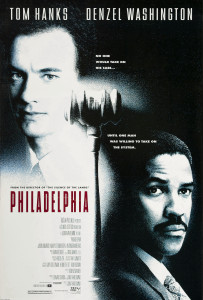 In The 40-Year-Old Critic, Venganza Media creator and host Arnie Carvalho recalls a memorable film for each year of his life. This series appears daily on the Venganza Media Gazette.
In The 40-Year-Old Critic, Venganza Media creator and host Arnie Carvalho recalls a memorable film for each year of his life. This series appears daily on the Venganza Media Gazette.
In many of these reviews I have observed how film can be an experience that takes you to other places and vicariously allow you to have extraordinary adventures. That was my childhood focus for films — escapist entertainment. As I aged, though, I came to discover film could also educate and open a window into the world of people totally different than myself.
The film that drove that point home more than any that came before was Jonathan Demme’s Philadelphia — a film I initially had no interest in seeing.
The picture had good people involved. Demme was not a favorite director of mine, but I had enjoyed Married to the Mob and fell in love with The Silence of the Lambs; the latter preceding Philadelphia by a couple of years. Likewise, co-star Denzel Washington had impressed me in his Oscar-winning role in 1989’s Glory. Both of these talents I liked, but neither did I love.
That affinity was thwarted by two large barriers.
My biggest problem with the film, before I even saw it, was star Tom Hanks. I had loved Hanks in the 80s. I had seen every episode of Bosom Buddies at least three times each; along with most of his films — Splash, Big, and Turner & Hooch are favorites. But by 1993 I felt Hanks was washed-up; a product of the 80s. The turn of the decade came and Hanks was starring in two of the worst films I had ever seen: Joe Versus the Volcano and The Bonfire of the Vanities. Sleepless in Seattle had also put me to sleep in theaters, and despite his acclaimed supporting role in A League of Their Own, I felt done with Hanks entirely.
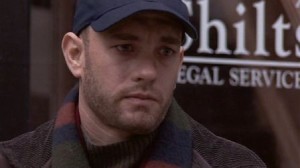
Despite having been a fan of Hanks in the 80s, he was a barrier to my seeing Philadelphia.
More, I pigeonholed him as a comedian. The thought of this guy doing a dramatic performance as a gay man dying of AIDS seemed funny for all the wrong reasons. I thought it was miscasting of the worst possible kind and that the film would be a train wreck.
But no matter who starred in the film, I still wouldn’t have rushed to see this it. From the trailers, from the interviews I read, from the film’s very premise, Philadelphia seemed like a movie with an agenda.
I had seen similar films by this point, from Born on the Fourth of July, to 1987’s Project X, to Gorillas in the Mist. I found them to be self-important slogs that would often have an effect opposite of what was intended. I was so put off by the picture I would feel kinship with the opposition. I had started to avoid “message movies” altogether.
Additionally, I was untouched by the AIDS epidemic. I had seen it covered on television shows like L.A. Law and St. Elsewhere and some “very special” sitcom episodes. I had watched the explosion of news coverage in the 80s. I was in the safe-sex ed classes in high school. I felt I knew all I needed to know, and I didn’t need to pay $7 for a movie to try and drive that point home again.
Further still, I wasn’t gay and, despite being a college student, had no gay friends (at least none that I knew of). Again, I had seen gay characters on television and in other films, but it was not a lifestyle, or even a cause to which I felt connected. My suburban, middle-class lifestyle made it all very unrelatable.
A combination of factors changed my mind, and I ended up seeing Philadelphia in theaters its opening week. First was the buzz surrounding the film. Critics I respected, and those who had lambasted Bonfire, heaped praise upon the film. It had started to become a topic of conversation among my friends.
Then there was the Bruce Springsteen song “Streets of Philadelphia”, a haunting piece that got heavy radio airplay. Never underestimate the power of a hit song to bring audiences into a movie — it worked for me. I wanted to see the film that could get The Boss to perform this song in a broken voice that made it sound as if he were on the verge of tears during the recording session.
Finally, my Now Playing Podcast co-host Stuart was in town for the holidays, and we would often see movies together on Christmas Day. We had already gone to see What’s Eating Gilbert Grape and were struggling to agree on a second film to watch. He suggested Philadelphia. By that point my curiosity was piqued, so we went.
It is a fine film. Not phenomenal, not outstanding, but very well done. I felt that way then, and now upon revisiting this film. The court case, which is ostensibly the film’s plot, is engaging. It clicked with me as a long-time fan of courtroom dramas. Still, the movie wasn’t only about the plot. This is a “message movie” and the point is to start conversation about homophobia in the workplace, and a true understanding of people not only dying from, but living with AIDS.
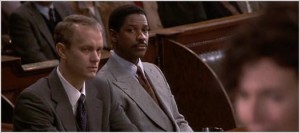
If what you want is a good courtroom drama, there are better out there. This plot is secondary to the human message of the film.
As such the plot does feel incidental.
As do any characters other than Hanks’ Andrew Beckett. The whole film is structured to engender audience sympathy for this man who lost his job, and eventually his life, due to his lifestyle and disease. Demme’s attempt to make the viewer connect with Beckett is obvious to me on a recent viewing.
More, Beckett is a character without much of an arc. He remains put-upon and in the right for most of the film. A late revelation on how he contracted the disease is a strange turn of events, but it doesn’t change Beckett for me. By that point in the film you were either on his side or walking out of the theater.
The true character arc is that of Washington’s Joe Miller. He plays Beckett’s lawyer and, over the course of the film, changes from a homophobe ignorant of AIDS and how it is transmitted, to understanding and accepting of Beckett’s lifestyle. Still, due to the script and the director, Washington’s performance and character is lost in Hanks’ shadow.
As for Hanks, who I expected to hate in his first highly dramatic screen role, Demme’s filmmaking was a success — I became fond of Beckett. The affinity I had for the actor helped me feel very comfortable with the dying lawyer he portrayed on screen. Perhaps it even created a feeling of closeness I wouldn’t have had if Beckett had been portrayed by someone unknown. Hanks physically transformed himself, losing a lot of weight to physically appear ill, and it did help both his performance and my sympathy for Beckett.
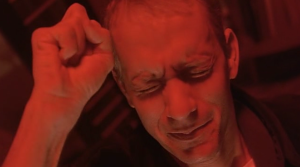
Did audiences really fall for this blatant manipulation? The film was moving, but this scene was too obvious in its pulling of the heart strings.
All that praise aside I do roll my eyes, unmoved by Hanks’ speech while playing an opera for Miller. The dramatic, high camera angle, Hanks’ closed-eye monologue with his hands raised to his head, it was the one scene of the film that felt unauthentic and overly manipulative. I imagined Hanks, after the take, grinning and telling his assistant “that is my Oscar moment.” Not only did the scene feel fake, I don’t think Hanks “sold” it to me. It was the one time I stopped seeing Andrew Beckett, and instead saw Tom Hanks. I also thought voters for the Academy Awards would be smarter than to fall for such chicanery… shows what I know about awards. They fell for it, and Hanks took home a gold statue, probably because of this very scene. With Forrest Gump the following year Hanks’ career hit new highs, and he keeps climbing to this day.
Yet I did feel moved at the end when Beckett lay in the hospital bed dying. Over the course of two hours I came to care for this man, and though his end was a foregone conclusion it still held impact.
I went into the film understanding how AIDS worked. When Miller goes to his doctor to see if he contracted AIDS from a handshake, that to me — even in 1993 — felt like an antiquated notion. More, I felt no bigotry towards homosexuals. I was a minority student at a liberal arts college and in my mind I held no judgement for anyone based on race, creed, gender, or orientation.
Still, this film opened my eyes. I may not have been discriminatory towards homosexuals, but that doesn’t negate that gays are discriminated against. I had thought that if I wasn’t a bigot than bigotry wasn’t my problem. This film helped me see another side. My views on AIDS and homosexuality were about me, this film helped me think about others. Philadelphia allowed me to experience the day-to-day life and struggles of homosexuals. No matter if I was bigoted, they must face and overcome bigotry. Just because I knew from classes how AIDS was transmitted, the film told me that even educated adults were sometimes ignorant about this disease. I may have had no gay friends, but this film made me feel as if, for two hours, I did. And I didn’t fear them or hate Andrew Beckett. I felt compassion.
More, this was one of the first homosexual characters I’d seen on screen that did not feel stereotypical. I didn’t think I knew any gay people because, in my teenaged mind, gays did not act the same as straight men. The epitome of this is Meshach Taylor’s Hollywood in Mannequin, but also George Hamilton’s Zorro, The Gay Blade, and Damon Wayans and David Alan Grier’s “Men on Film” sketch from In Living Color follow this pattern. Even the more toned down homosexual characters I knew, such as Billy Crystal’s Jodie Dallas on Soap, had affected mannerisms.
Hanks’ performance as Beckett was not a parody or a caricature — in most ways he acted like Hanks. Plus all those characters I listed were played for comedy; their homosexuality was cause for laughter. Here I was seeing homosexuality as cause for… nothing. He was just like everyone else.
This film was the first true step in my life toward a greater understanding, not just of gays but all people different from me. It helped me fully realize that a person cannot be judged by any single aspect of their character, but their whole being and the sum of their life experience.
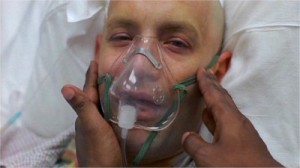
Hanks’ commitment to the role was admirable. By the end of the film he was unrecognizable.
And I wasn’t alone. Philadelphia helped break down many walls. It seemed, after this film, gay characters became more accepted by mainstream America. On television, from My So-Called Life to Pedro Zamora on the 1994 season of MTV’s The Real World, I started to see more representation of gays.
Yet they all paled compared to the 1996 ER episode which revealed Gloria Ruben’s character Jeanie Boulet to be HIV positive — the first instance I saw of someone not dying from AIDS, but living with HIV. From films like My Best Friend’s Wedding and The Next Best Thing to Ellen Degeneres’ coming out on Ellen, Philadelphia made it okay for these stories to be told.
Given the weaknesses I see in the film itself, I’m not sure that it would hold up for new viewers. For more than 20 years this film has been in the public consciousness, and American culture has changed as a result. As such, in an era of Queer as Folk, Will and Grace, and even a gay married couple on Modern Family, the film just wouldn’t seem as groundbreaking as it truly was.
But I cannot rewatch this film and not think of the world in which I lived in 1993, and how Philadelphia changed that world forever.
Tomorrow — 1994!
Arnie is a movie critic for Now Playing Podcast, a book reviewer for the Books & Nachos podcast, and co-host of the collecting podcasts Star Wars Action News and Marvelicious Toys. You can follow him on Twitter @thearniec
August 23, 2014 Posted by Arnie C | 40-Year-Old Critic, Movies, Now Playing Podcast, Podcasts, Reviews | 1990s, 1993, 40-Year-Old Critic, AIDS, Antonio Banderas, Denzel Washington, Enertainment, Film, HIV, Jonathan Demme, Message Movie, Movie, Movies, Now Playing, Philadelphia, Podcasts, Review, Reviews, Tom Hanks | Comments Off on 40 Year-Old-Critic: Philadelphia (1993)
-
Archives
- February 2021 (1)
- January 2021 (1)
- December 2020 (1)
- November 2020 (3)
- October 2020 (2)
- September 2020 (1)
- August 2020 (2)
- July 2020 (1)
- June 2020 (1)
- May 2020 (1)
- April 2020 (3)
- March 2020 (2)
-
Categories
-
RSS
Entries RSS
Comments RSS
Site info
Venganza Media GazetteTheme: Andreas04 by Andreas Viklund. Get a free blog at WordPress.com.
